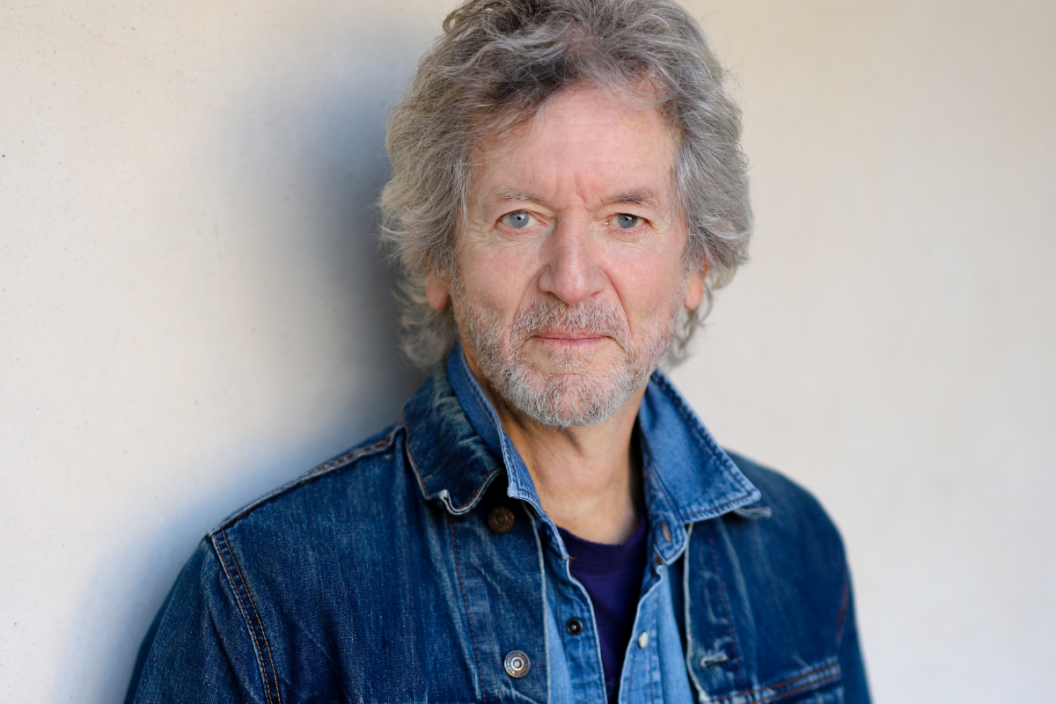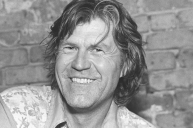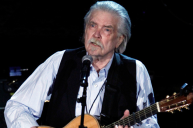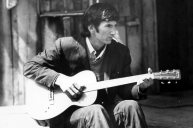In the summer of 1972, a 22-year-old singer-songwriter named Rodney Crowell moved to Nashville. The Houston-born artist soon became a regular at Guy Clark's songwriting circles (with fellow up-and-comer Steve Earle) and would go on to play a role in countless factions of country and Americana music, forming a band called The Cherry Bombs with Vince Gill and Tony Brown, joining Emmylou Harris' Hot Band and penning songs for Bob Seger ("Shame on the Moon"), Tim McGraw ("Please Remember Me"), the Oak Ridge Boys ("Leavin' Louisiana in the Broad Day Light"), Emmylou Harris ("Ashes By Now") and many more.
Now, at 70 years old, Crowell himself has become a beacon for great songwriting, alongside his late, great mentors Guy Clark and Townes Van Zandt. And while his songwriting process writing may have changed slightly over the years, the approach — to be honest and truthful above all — has remained steadfast, as evidenced by his latest album Triage (out July 23), which reflects on spirituality, mortality, forgiveness and universal love.
Wide Open Country caught up with Crowell to discuss Triage, his songwriting process, earning inspiration, learning from Guy Clark and more.
(This interview has been edited for length and clarity.)
Wide Open Country: You've said the theme of this album is universal love. Why was it important for you to reflect on that idea for this album and how did it shape the songs?
Rodney Crowell: Well, it's a broad stroke. Heady for the subject matter, I suppose. But I couldn't think of anything else. I've had some time to think about it and, in the so-called divided culture that we live in, the one thing that, for me, is beyond politics and all of that is all creation...Not everybody has a relationship with one God, you know? I'm not at all religious, but it's a combination of things for me. It's this earth we live on, this life force, its generosity to give us everything we need. It's all right there. The sunshine grows crops and we just treat it with almost disdain and it concerns me. So when things concern me, being a songwriter, I generally write about them. I personally think we should be so much more reverent about this earth, this sphere on which live, because it's sustaining our lives.
Wide Open Country: The song "I'm All About Love" reflects that concept — the idea of attempting to love every living thing, even if you don't always succeed. Can you talk about writing that song?
Rodnewy Crowell: I was thinking about that very thing, which is this spiritual life that I profess to live in recognition of all divine creation [and thinking] 'Well, hang on pal, are you able to own that you have the same place in your heart for Vladamir Putin that you have for Greta Thunberg?' That's a hard one for me because Greta Thunberg speaks about things that are very important to me and the future of this planet. But by the same token... if I'm putting my spiritual money where my mouth is, it behooves me to love Vladamir Putin or Donald Trump as much as I do Bob Dylan or... take your pick.
Wide Open Country: You wrote this album in some very uncertain and challenging times...did that impact your songwriting?
Rodney Crowell: Well it certainly impacted my songwriting in terms of what I would experience day to day and how my sensibilities allow me to process what I see and hear. But I learned a long time ago that topical songwriting, in particular political commentary, it'll date you in a hurry...If I were to be writing about the summer of 2020 in a defined way, by the summer of 2025, that's ancient history....That doesn't mean that those things don't influence or give you the impetus for what you want to write about. But to me, making this album, I was very careful to not be preachy, because I don't have all the answers and to even come off as if I think I know something is very unseemly. It's not a very flattering picture of one's own self. So, I have to start with humility, which is, Hey, look, I don't have half the answers I wish I had, but what I do have is a good heart, I think, and from that good heart, if I try to trust myself and write as truthfully as I can from my perspective, then it stands to reason I don't harm anyone. And it just may happen that I helped a few people along the way.
Wide Open Country: How has your songwriting process changed over the years?
Rodney Crowell: At this stage in my evolution as a songwriter, it is so much about discipline. If I'm not on the road performing — you could check with my wife on this — I'm up in the morning with a cup of tea or a cup of coffee and I'm writing. And I write day in and day out because, when I was a young man, inspiration would come to me kind of in lightning bolts, you know, really big bursts of inspiration that would be gifted to a 20-something year old songwriter. But as time goes on, wherever the gifts of inspiration comes from — it, she, whatever it is — looks down and says, 'Ah, this Rodney guy, you know what? He's dedicated. And he shows up to work every day. Let's give him a little dollop of inspiration and see what he can do with it.' I personalize this impersonal thing, but I really do feel like I earn my inspiration these days by being dedicated and by being disciplined.
Wide Open Country: You've talked about learning from Guy Clark and Townes Van Zandt...Do you now feel like you're able to mentor up and coming songwriters?
I would hope so. I would hope so. It's one of the things about Guy Clark — you know Guy Clark would say 'Bullsh*t. I don't mentor anybody.' [Laughs] But that's not true. Guy, for all of his curmudgeony negativity, he was an incredibly generous person. And he just opened up to me and shared the process of accessing good songs and making your intentions about writing a song about getting to the truth, whatever your truth is. I was willing. I'll say this about myself at that particular time, I was a willing open sponge for anything that would lead me toward writing better lyrics....With Guy, it was about language. So I would say that if there's someone young who's really open to confronting the truth about writing good lyrics, I'm there for them. I'm an open book. I'll share anything I can.
Wide Open Country: What is the most important thing you learned about songwriting from Guy Clark?
Rodney Crowell: Truth. No matter what angle or what poetic AB or ABC rhyme scheme you're using or whatever the notion of what the song is. Like Kris Kristofferson, 'I woke up Sunday morning with no way to hold my head that didn't hurt.' That's truth. And that's truth told... instead of 'I woke up Sunday morning with a headache, 'cause I drank too much last night.' That's not poetry, but 'I woke up Sunday morning with no way to hold my head'... First of all, how are you going to hold your head? You don't really hold your head, but it's a tool, a language tool, to make a statement that there's just no way on earth to have a brain inside this skull that didn't hurt. And that's the truth. And told with precision poetry.
That's just an example of how the truth can be told poetically. It's like Guy Clark — 'He ran his fingers through seventy years of living' which is a head full of gray hair, but you don't get that gray hair without living 70 years. Instead of 'the old man ran his hands through his hair,' it was poetry. That's what I look for. That's what I look for in myself. Can I access something like that?
Wide Open Country: The album's final song ["This Body Isn't All There is to Who I Am"] touches on spirituality and mortality...could you talk about what inspired the song and the process of writing it?
Well first of all, in my twenties and thirties and probably even into my forties, I would want to express these broad stroke love songs...I wanted to get them out there because I wanted [people] to love me. And as time goes on and as there becomes an actual departure date that I don't yet know, it seems like aging makes me want to create in a way where I want me to love me. I want to love myself and I want to be comfortable with myself. And because I think that as time goes on, spiritually, we start preparing to transition out of here. From my perspective, this spirit part of me is so much more than the spirit living in this body. And it seems to me that once we're released from these bodies, it's big and it's mighty and it's beautiful. That's my belief. And that's what I'm really saying in that song.
I cried my way through recording that song. My son-in-law and I were working on it and my daughter was in the other end of the studio. And I thought 'God, if she hears what we're singing about.' To hear her father sing about what it's going to be like to be out of here.... But it's there and it's not going away. So I might as well write about it.
'Triage' Track Listing:
- Don't Leave Me Now"
- "Triage"
- "Transient Global Amnesia Blues"
- "One Little Bird"
- "Something Has to Change"
- "Here Goes Nothing"
- "I'm All About Love"
- "Girl on the Street"
- "Hymn #43"
- "This Body Isn't All There Is to Who I Am"
Now Watch: 10 Legendary Instruments of Country Music




